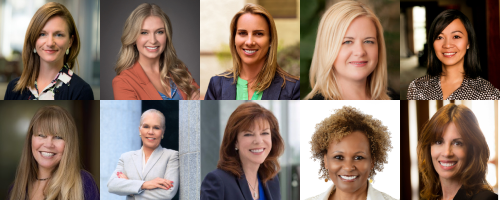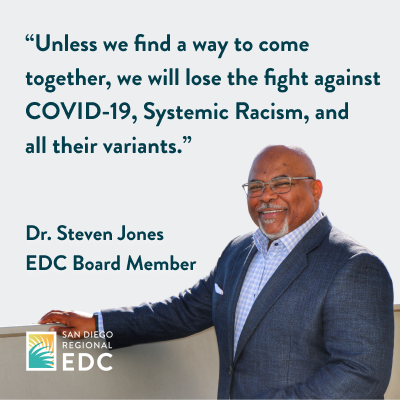 What do leaders at Qualcomm, SDG&E, and the NBA have in common? They’ve all made a commitment to have difficult conversations about how patterns of racial, gender, and other forms of biases are hijacking the potential of their workforce. That’s where JONES steps in. San Diego-based consulting firm JONES has helped create work environments for these companies, and many others, that bring out the best in people through leveraging trust, inclusion, and diversity for the past 25 years. Check out this spotlight with new EDC board member and JONES CEO Dr. Steven Jones to learn more about the firm’s leadership.
What do leaders at Qualcomm, SDG&E, and the NBA have in common? They’ve all made a commitment to have difficult conversations about how patterns of racial, gender, and other forms of biases are hijacking the potential of their workforce. That’s where JONES steps in. San Diego-based consulting firm JONES has helped create work environments for these companies, and many others, that bring out the best in people through leveraging trust, inclusion, and diversity for the past 25 years. Check out this spotlight with new EDC board member and JONES CEO Dr. Steven Jones to learn more about the firm’s leadership.
Describe your “day job”?
They say when you love what you do you never have to work a day in your life! Career counselors often advise others to identify their passion and turn it into a career. I have had the opportunity to live my passion every day and do what I love in my role as the CEO of JONES. JONES has recently been named one of the Top 10 Diversity and Inclusion Companies in the United States by Manage HR Magazine. For the past 25 years, I have been blessed to lead, learn from, and work with a phenomenal group of team members at JONES. Every day we help committed leaders at companies such as Toyota, Honda, Qualcomm, the NBA, SDG&E, Sony Music, Viacom CBS, SoCal Edison, Rady Children’s Hospital, the Getty, and many more, create work environments that bring out the best in people through leveraging trust, inclusion, and diversity for business success. Guiding culture change, providing executive coaching, conducting unconscious bias training, facilitating bilingual meetings, and supporting clients in having difficult conversations about how patterns of racial, gender, and other forms of biases are hijacking the potential of their workforce are daily menu items in life at JONES. As a CEO who is also a DEI Global Thought Leader and Organizational Psychologist, my ‘day job’ means guiding a team that helps companies unlock the people potential in their organizations.
What is your life-changing moment—something that changed the trajectory of your life for the better?
In the summer of 1987, I packed my Toyota Corolla with all my belongings, which included a suitcase, TV, and a boom box, and headed on a road trip from Louisiana to my new home in San Diego, CA. The destination was my first professional job as a Resident Director at Olmeca Hall on SDSU’s campus. I was to become the first African American/Black person to run a residence hall in the history of the university (a trail I would repeat blazing at the University of San Diego in 1990). In my second year at SDSU, my boss “voluntold” me that he and I were going to conduct a diversity training for 150 student leaders. I was pursuing a master’s degree in Computer Science at the time and had never conducted diversity training before, so I was confused by his request. Two weeks before the training, I learned he was leaving the university and insisted that I still conduct the training, but solo. I continue to be grateful for Dr. Jesus Nieto and Kasimu Harley, two social justice warriors on SDSU’s campus who helped me organize the agenda for the training. The experience was amazing. There were lots of insights gained, lessons learned, and skills practiced by student leaders. At that moment, I knew my life would never be the same.
Of all the boards in San Diego, why EDC?
I have been impressed by the authentic leadership of Mark Cafferty and Janice Brown, along with San Diego Regional EDC’s commitment to economic inclusion. I was moved to join the EDC’s Board because of its work with the Brookings Institute, which identifies economic inclusion as “crucial” to San Diego’s success. The need for San Diego employers to act in a way that closes the minority-achievement gap, equips small businesses to compete, and to recruit/retain diverse talent in our community are personal passions of mine. JONES supports organizations large and small to become employers of choice—ones that recruit, select, develop, promote, and retain a diverse workforce who thrive. We are excited to join the impressive group of business and community leaders on EDC’s Board of Directors who are also committed to work environments where that diversity drives innovation through high levels of trust, psychological safety, equity, and belonging. With all of us working together, we can do this!
What EDC program or initiative interests you most, and why?
The need to enhance the San Diego community so it leads the world in creating an equitable and inclusive ecosystem that exists across our impressive corporate, small business, educational, military, tech, life sciences, hospitality, and other industries is very interesting to me. We have work to do to make “America’s Finest City” great for all its constituencies.
Over the last year, our country and communities have simultaneously endured a pandemic, a social justice movement, and a time of hostile and divisive politics. What is your biggest lesson learned in the last year?
One thing has been made abundantly clear to me: it is essential that each of us take collective action to keep one another safe. Each of us was challenged to reevaluate our individual and collective versions of normal. Every aspect of our lives shifted—how we worked, how classes were taught, whether we traveled, socialized, and the amount of time we spent with nuclear and extended family, etc. We understood that we needed collective action on a global scale to defeat COVID-19, a battle we are still fighting.
Simultaneously, the world moved into action to defeat our second global pandemic, Systemic Racism, which also continues today. Protests and marches were held around the globe to demand that we increase the lengths we are willing to go to keep each other, especially members of our BIPOC communities, safe and alive. We battled over “all lives matter” vs. “blue lives matter” vs. “black lives matter.” Many people realized how interconnected these three statements are while others refused to reexamine the history that impacts the deeply rooted inequities sustained in our present-day systems. Unless we find a way to come together, we will lose the fight against COVID-19, Systemic Racism, and all their variants… it is essential that each of us take collective action to keep one another safe.
Favorite quote:
“Life’s most persistent and urgent question is, ‘What are you doing for others?’” —Dr. Martin Luther King, Jr.
Follow along with Dr. Jones on LinkedIn.
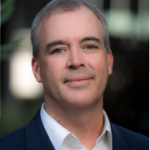
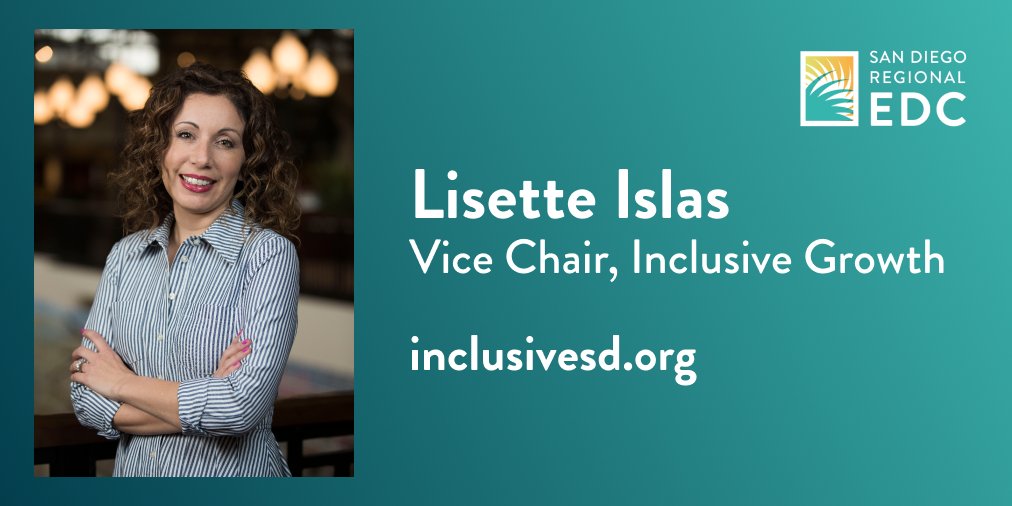 “Every crisis and recovery that the U.S. economy has endured has increased systemic poverty and widened inequalities in Black and Brown communities. As I take on this new role with EDC, I’m committed to working together with the region’s leading employers to get this recovery right. San Diego’s economic competitiveness depends on it,” said Lisette Islas, Vice Chair of Inclusive Growth, San Diego Regional EDC.
“Every crisis and recovery that the U.S. economy has endured has increased systemic poverty and widened inequalities in Black and Brown communities. As I take on this new role with EDC, I’m committed to working together with the region’s leading employers to get this recovery right. San Diego’s economic competitiveness depends on it,” said Lisette Islas, Vice Chair of Inclusive Growth, San Diego Regional EDC.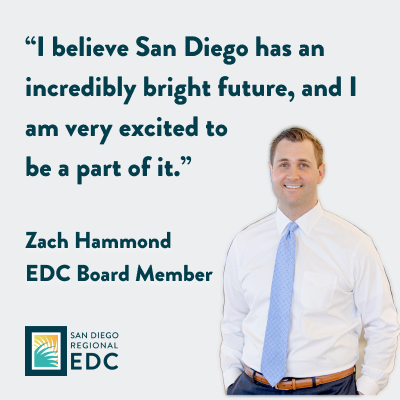 What does it take to move cross-country for your job? So you packed your home and family and moved from one coast to the other. Sunsets instead of sunrises, warm weather year-round instead of snow days, trips to the “beach” instead of to the “shore.” Now what? Some might say it takes moving to a place you truly believe in. We got the chance to chat with a board member about just that. Check out this board spotlight with
What does it take to move cross-country for your job? So you packed your home and family and moved from one coast to the other. Sunsets instead of sunrises, warm weather year-round instead of snow days, trips to the “beach” instead of to the “shore.” Now what? Some might say it takes moving to a place you truly believe in. We got the chance to chat with a board member about just that. Check out this board spotlight with 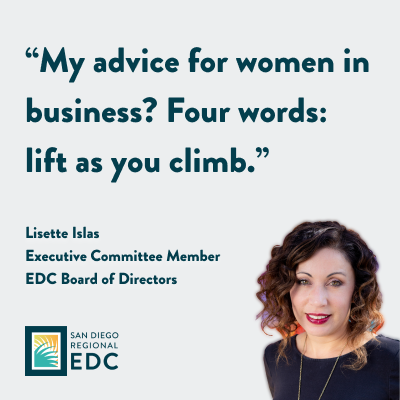 In recognition of Women’s History Month, we are publishing a series of blogs about the women behind EDC—our fearless leaders, our board members, our executive committee, our guiding lights. To close the month, we are featuring a woman that San Diego is lucky to have. The Executive Vice President and Chief Impact Officer for
In recognition of Women’s History Month, we are publishing a series of blogs about the women behind EDC—our fearless leaders, our board members, our executive committee, our guiding lights. To close the month, we are featuring a woman that San Diego is lucky to have. The Executive Vice President and Chief Impact Officer for 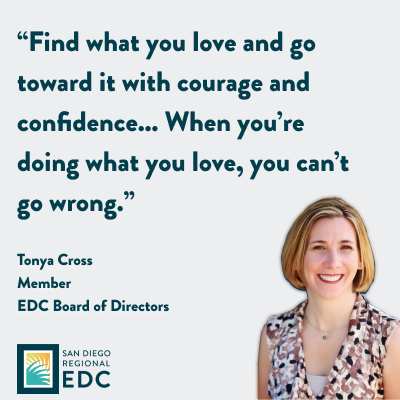 In recognition of Women’s History Month, we are publishing a series of blogs about the women behind EDC—our fearless leaders, our board members, our executive committee, our guiding lights. Below you’ll learn more about Tonya Cross, SVP of people and corporate operations at
In recognition of Women’s History Month, we are publishing a series of blogs about the women behind EDC—our fearless leaders, our board members, our executive committee, our guiding lights. Below you’ll learn more about Tonya Cross, SVP of people and corporate operations at 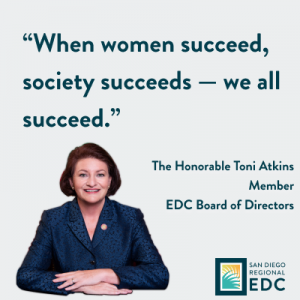 In recognition of Women’s History Month, we are publishing a series of blogs about the women behind EDC—our fearless leaders, our board members, our executive committee, our guiding lights. Today, we have
In recognition of Women’s History Month, we are publishing a series of blogs about the women behind EDC—our fearless leaders, our board members, our executive committee, our guiding lights. Today, we have 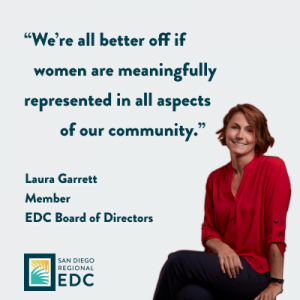 In recognition of Women’s History Month, we are publishing a series of blogs about the women behind EDC—our fearless leaders, our board members, our executive committee, our guiding lights. Today, we introduce Senior Vice President (SVP) of Human Resources at
In recognition of Women’s History Month, we are publishing a series of blogs about the women behind EDC—our fearless leaders, our board members, our executive committee, our guiding lights. Today, we introduce Senior Vice President (SVP) of Human Resources at 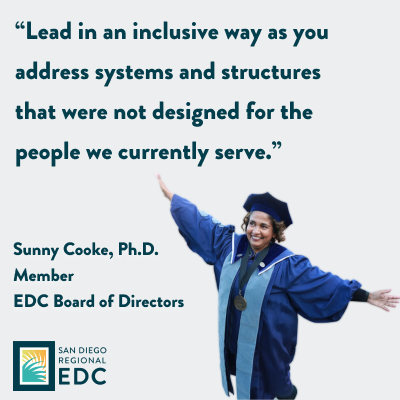 In recognition of Women’s History Month, we are publishing a series of blogs about the women behind EDC—our fearless leaders, our board members, our executive committee, our guiding lights. Up next, an inspiration for women and immigrants in STEM, President/Superintendent of Mira Costa College,
In recognition of Women’s History Month, we are publishing a series of blogs about the women behind EDC—our fearless leaders, our board members, our executive committee, our guiding lights. Up next, an inspiration for women and immigrants in STEM, President/Superintendent of Mira Costa College, 